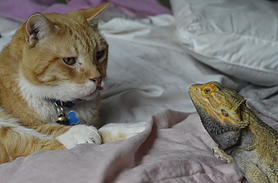 Salmonella is a type of bacteria that can cause disease in humans, and can be particularly dangerous to young children and infants, the elderly, and adults with immune system problems.
Salmonella is a type of bacteria that can cause disease in humans, and can be particularly dangerous to young children and infants, the elderly, and adults with immune system problems.
Healthy reptiles may host a variety of Salmonella species of bacteria in their intestinal tracts. They may shed the organism in the stool from time to time, and show no physical symptoms. Salmonella can be cultured from the stool during periods of active shedding, but even if the stool culture is negative, this does not guarantee that the animal will not shed the organism in the future. Also, Salmonella can persist in the environment for a long time if proper disinfection is not carried out.
Antibiotics are not effective and reliable for Salmonella infections in reptiles. In fact, antibiotic use can actually result in the development of strains of bacteria that are resistant to antibiotics. Animals that are positive for Salmonella are a serious public health risk.
**To totally eliminate the risk of Salmonella, the only option is to not keep reptiles**
Owners who choose to keep reptiles should assume that Salmonella might be present and follow these guidelines:
- Never eat, drink, or put anything in your mouth when working with reptiles.
- Wash hands with hot water and antibacterial soap after handling reptiles.
- Wash all cages and cage furnishings in hot soapy water, then disinfect with household bleach (one cup in a gallon of water). Contact time should be at least 30 seconds. Rinse thoroughly.
- Clean cages frequently and thoroughly. Remove uneaten food and wash bowls daily.
- Do not clean cages or wash bowls in sinks or tubs that are used by people. When cleaning cages, pour waste water down the toilet.
- Confine reptiles to a cage. Children, the elderly and immune-compromised individuals should not handle reptiles.
- Sick or dead animals should be examined by a veterinarian to determine if Salmonella is present.

